
Domov | O Zborniku | SDUTSJ

Inter Alia 2, Ljubljana, februar 2011
ISBN: 978-
ISSN:
Nataša Gajšt
A glossary-
ABSTRACT
Learning technical terminology is an important goal in ESP training. To this end,
students adopt various approaches, one being reading texts which abound with technical
words and phrases. However, students often do not have enough linguistic knowledge
to understand specific terminology in a foreign language. In order to find the meaning
of such terminology and acquire new vocabulary they use dictionaries and glossaries,
yet they often lack the sufficient skills to use these and other suitable resources.
The objective of this paper is to present the analysis of an activity which was implemented
within the first and third year university-
The central idea behind this activity was to encourage the students’ autonomous learning of technical terminology by reading technical literature and using various forms of dictionaries, glossaries and terminology databases. At the same time, the tasks are aimed at raising the students’ awareness of the importance of assessing the appropriateness of the information these resources provide. The paper is divided into three sections. First, the rationale and implementation of the activity are presented. Second, the results of the analysis of the students’ work are given and discussed in terms of the selection of professional papers and terminology, choice of definitions of terminology and their translations into Slovenian. In the conclusion, the focus shifts to the outcomes of the activity.
Keywords: reading, language for specific purposes, learner autonomy, terminology acquisition, bilingual dictionaries, glossaries, terminology databases.
1. Introduction
The instruction of languages for specific purposes comprises various language related
occupational skills and competences of which lexical competence is just one. According
to Knight (1994: 285), “vocabulary acquisition is considered by many to be the single
most important aspect of foreign language learning. Not only do the majority of students
studying foreign languages cite vocabulary as their number one priority [...] but
it is often considered a priority by teachers as well” (ibid: 285). At lower levels
of language instruction, the students generally acquire vocabulary through course
books and to some extent, this is also true for higher levels of language instruction,
i.e. university-
Students may acquire the language of a specific occupation or field in a variety of ways. Undoubtedly, extensive reading of relevant material (i.e. various types of professional and scientific papers and books) greatly contributes to foreign language learning. Tumolo (2007: 480) discusses the role of reading in vocabulary knowledge by advocating the approaches put forward by Krashen (1981, 1982, 1989) and Brown (1994) concerning either indirect or direct language instruction. In his study, he proposes a combination of “direct and indirect instructions to assist the learners in their process of vocabulary learning, that is, a balance between implicit and explicit, indirect and direct, teaching procedures for learning a foreign language” (ibid: 480). Thus, language instruction in the classroom should be accompanied by individual work in the form of the reading of longer texts.
Students may learn a large proportion of specific profession-
Looking at the process of vocabulary acquisition, Mohseni-
One of the tasks of any language instructor is therefore to help his/her students
learn how to use these resources effectively and appropriately. A number of authors
have dealt with the appropriateness of either monolingual or bilingual dictionaries
in language learning (e.g. Laufer and Hadar, 1997; Hulstijn, Hollander and Greidanus,
1996; Hunt and Beglar, 2005). Both types of dictionaries have advantages and disadvantages
connected with the level of the students’ language proficiency. Apart from these
two types of dictionaries, bilingualized compromise dictionaries are growing in importance.
“A bilingualized entry typically includes: L2 definitions, L2 sentences information
or L1 synonyms of the headword. These hybrid and fused dictionaries essentially provide
translations in addition to the good features of monolingual dictionaries. Using
bilingualized dictionaries is more efficient than using separate bilingual and monolingual
dictionaries, and they are more flexible because beginning and intermediate learners
can rely on the L1 translation and advanced learners can concentrate more on L2 part
of the entry” (Mohseni-
Bilingual instruction of specific profession-
Another relatively important element of university-
To recapitulate, the discussion so far has looked at the various factors which play
an important role in successful language learning, particularly in specific profession-
Bearing these foundations in mind, we have developed an activity in the form of a
written assignment (seminar paper) with the aim of achieving the goals connected
with the acquisition of specific vocabulary. The primary goal was to help the students
acquire a higher level of knowledge of specific subject-
The entire activity was developed with the aim of testing:
a) whether or not the students will have any problems in selecting their reading material;
b) whether or not the students will have any problems in selecting business/economics vocabulary;
c) whether the students will find it difficult to find suitable definitions for the selected business/economics vocabulary;
d) to what extent the students will find it difficult to carry out the activity in a bilingual context;
e) whether the students will consider the task beneficial, despite its difficulty, since it would enhance their autonomy in learning a foreign professional language.
2. METHODOLOGY
2.1 Test design
The purpose of the seminar paper was two-
As has already been mentioned, the students had to write a seminar paper to facilitate their learning of professional vocabulary. The structure of the activity reflected the main goals as presented in the introduction.
2.2 Test subjects
The seminar paper was assigned to the 1st year students of the Industrial Engineering university programme and the 3rd year students of the Economics and Business Sciences programme within the courses Business English 1 and Business English 3 in the winter semesters of the academic years 2008/2009 and 2009/2010. For the 1st year students, this was their first semester of studying business English; whereas, for the 3rd year students it was their fifth semester of business English instruction. Table 1 shows the distribution and the number of students who submitted their seminar papers. The data reflect the number of students enrolled.

Table 1: The number of students submitting the seminar papers per year of study and per academic year
2.3 Task procedure
The implementation of the students’ task was divided into three stages. In the first stage, the students received detailed instructions at the beginning of the academic year (i.e. in October) concerning the requirements of the task. They were given two weeks to select the reading material and the business/economics vocabulary. In the second stage, the main and most important sources of information for the terminological section of the seminar paper, i.e. ‘Selection of terminology’, were presented and the students received the information on the available printed and online resources (monolingual and bilingual specialised economics and business dictionaries, glossaries and databases). We emphasised the use of ‘Evroterm – Multilingual terminology database’1 and a number of dictionaries available in the faculty’s reference library. The students were also provided with a list of online glossaries and dictionaries (for a selection of these online resources see Appendix 2). The third stage was the students’ individual execution of the task in which they had to find the appropriate definitions of their selected lexical items and translate them into Slovenian. The students were allowed to consult the lecturer if they encountered any difficulty in the selection stage. The time available for writing the seminar papers was 10 weeks; after that, the seminar papers had to be submitted for assessment.
2.4 Data collection
After the papers were collected, a qualitative and quantitative analysis of the execution of the task was carried out on the basis of the students’ comments about the different stages of the activity and from the linguistic aspect of the translations of lexical items and their definitions.
As regards the students’ comments, we looked at (1) the selection of texts, (2) the selection of lexical items, (3) the choice of definitions, (4) the translation (vocabulary and translation process) as well as (5) the observations concerning the students’ personal achievements. Bearing in mind the aims of testing, we were mainly interested in establishing how the students approached the selection of reading material, their reasons for choosing particular texts and any difficulties they faced in the process. Concerning the selection of lexical items, we were interested in establishing on what grounds they chose individual lexical items and any difficulties this part of the task presented. The analysis of the students’ choices of definitions concentrated mainly on the issues related to finding and selecting the appropriate definitions; whereas, the translation section of the task was assessed in terms of the issues related to finding and selecting appropriate Slovenian equivalents of the English words and phrases. Finally, we wanted to find out how the students felt about the task as such and what they gained from completing it.
The linguistic aspect of translation focused briefly on the selection of texts and the selection of resources combined with the correct choice of definitions and the appropriateness of translations. An analysis of the grammatical accuracy of translated definitions did not fall within the scope of this paper, as the students were neither language specialists nor students of English or translation studies. The focus was thus on the suitability of translated terminology and definitions from the point of view of their meaning.
3. Results
For the purpose of this contribution, we investigated the students’ comments and their translations as defined in the section on data collection above. In total, 67 seminar papers submitted by 1st year students and 69 seminar papers submitted by the 3rd year students were analysed. All the results are presented from the quantitative and qualitative aspect. The qualitative aspect of the analysis is presented in the form of the actual students’ comments.
3.1 Students’ comments
3.1.1 Selection of texts
The first item under analysis was the selection of texts. Figure 1 shows the results related to the selection of materials.
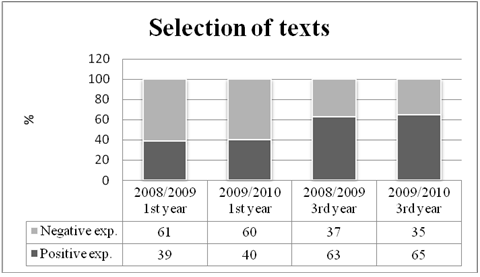
Figure 1: Selection of texts
It can be seen that 61% (in 2008/2009) and 60% (in 2009/2010) of the 1st year students found it difficult to choose the reading material. The analysis of the comments showed that the prevailing reasons were2:
-
-
-
-
-
-
-
In contrast, 39% (in 2008/2009) and 40% (in 2009/2010) of the 1st year students experienced no major difficulties in selecting the material for the analysis. According to them, they liked the fact that they could select the article on their own but mainly they selected the material because:
-
-
-
-
On the other hand, 37% (in 2008/2009) and 35% (in 2009/2010) of the 3rd year students considered the selection of material to be a demanding task. A survey of their comments revealed that most of them had the same problems:
-
-
However, 63% (in 2008/2009) and 65% (in 2009/2010) of the 3rd year students had a positive experience regarding the selection of the material. This was mainly due to the following three reasons:
-
-
-
3.1.2 Selection of lexical items
The next item under analysis was the selection of lexical items. Figure 2 presents the results for all four groups of students. Again, we divided the answers according to the students’ feedback (difficulties and positive experience).
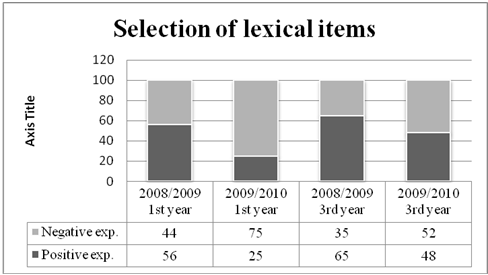
Figure 2: Selection of lexical items
The percentage of the 1st year students who found the selection of lexical items difficult was as follows: in 2008/2009, 44% of the students found this task demanding while in 2009/2010 this percentage was higher, i.e. 75% (two year average: 59.5%). According to the students, the main problems they experienced were related to:
-
-
-
-
-
On the other hand, 56% (in 2008/2009) and 25% (in 2009/2010) of the 1st year students reported no major difficulties in this part of the task (a two year average: 40.5%). Again, their reasons were more or less the same:
-
-
-
An average of 43.5% of the 3rd year students (i.e. 35% in 2008/2009 and 52% in 2009/2010) reported having difficulties in selecting the appropriate lexical items. The prevailing negative comments of both groups are given below:
-
-
-
More than half (i.e. 56.5%) of the 3rd year students (i.e. 65% in 2008/2009 and 48% in 2009/2010) had no difficulty in choosing the required fifteen lexical items for their seminar papers. They selected the lexical items based on:
-
-
-
-
3.1.3 Choice of definitions
The distribution of the students’ comments regarding the definitions to be included in the seminar paper is shown in Figure 3.
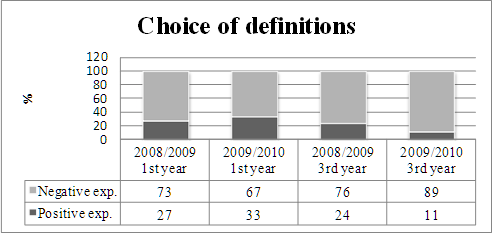
Figure 3: Choice of definitions
The results presented in Figure 3 show that the majority of students in all four groups reported some kind of difficulty in finding and selecting the appropriate definitions to include in their seminar papers. The analysis of the students’ comments revealed that most of them reported mainly on the process of finding the definitions. An average of 70% of the 1st year students (i.e. 73% in 2008/2009 and 67% in 2009/2010) mentioned:
-
-
-
-
-
-
-
-
Nevertheless, 27% of the 1st year students in 2008/2009 and 33% in 2009/2010 found the search for definitions unproblematic, providing the following reasons:
-
-
-
The distribution of the answers of the two groups of 3rd year students indicates that the negative experience (i.e. difficulties) was common to as many as 82.5% of all 3rd year students (i.e. 76% in 2008/2009 and 89% in 2009/2010). According to them, this happened because:
-
-
-
-
-
-
-
-
-
Less than one fifth (i.e. 17.5%) of the students in this category (i.e. 24% in 2008/2009 and 11% in 2009/2010) reported no major difficulties, commenting that finding the definitions was not as difficult as it had seemed.
Parallel to these findings, an analysis of the resources used was also conducted.
It was established that, on average, 73% of the 1st year students predominantly consulted
general monolingual online dictionaries (e.g. www.ldoceonline.com, www.dictionary.cambridge.org,
www.yourdictionary.com) and, to a lesser extent (i.e. 23%), specific dictionaries
and glossaries (e.g. www.businessdictionary.com, www.financial-
3.1.4 Translation (translating vocabulary and translation process)
Figure 4 presents the results of the students’ comments regarding the translation element of the seminar paper.
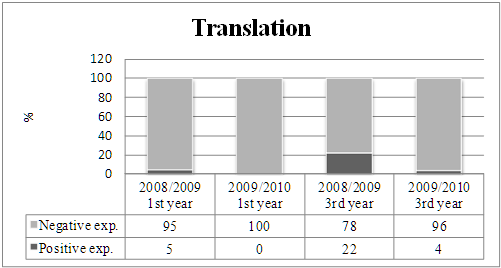
Figure 4: Translation (translating vocabulary and translation process)
Figure 4 demonstrates that, on average, 97.5% of the 1st year students (i.e. 95% in 2008/2009 and 100% in 2009/2010) considered the translation of lexical items and definitions as complicated. In their comments they discussed both the issues related to the translation of the vocabulary and the translation process in general. Their reasons why this task was so demanding are given below:
-
-
-
-
-
-
The students who did not report any difficulties (only 2 students in 2008/2009) claimed that the translation did not present any serious problems.
Analysing the comments made by the 3rd year students, we can see that as many as 87% of the students in both academic years (i.e. 78% in 2008/2009 and 96% in 2009/2010) claimed that they faced a number of problems, including:
-
-
-
-
-
-
-
-
-
-
-
However, only 13% of the 3rd year students had no major difficulties with the translation stage of the seminar paper (i.e. 22% in 2008/2009 and 4% in 2009/2010). In their comments they stated that it was not as difficult as it had appeared at the beginning.
The analysis of the students’ comments also revealed that a few of them made reference to online translation tools such as ‘Google Translate’ and ‘Amebis Presis’3 although they had been clearly instructed to avoid any automatic translation tools.
3.1.5 Personal achievement
The last section of the students’ comments was devoted to their personal achievements. Figure 5 presents the views of all groups of students.
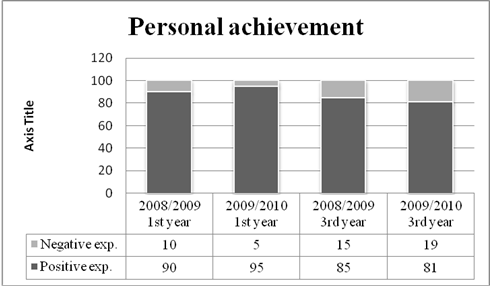
Figure 5: Personal achievement
The average percentage of 1st year students with a positive experience in both academic years was 92.5% (i.e. 90% in 2008/2009 and 95% in 2009/2010). They gave a wide range of reasons:
-
-
-
-
-
-
-
-
On the other hand, 7.5% of the 1st year students (i.e. 10% in 2008/2009 and 5% in 2009/2010) considered this task to be demanding. They stated that this was because:
-
-
Looking at the results obtained from the analysis of the 3rd year students’ comments, we can see that as many as 83% of the students (i.e. 85% in 2008/2009 and 81% in 2009/2010) graded the activity as useful. Their comments are given below:
-
-
-
-
-
-
-
-
-
On average, 17% of the 3rd year students (i.e. 15% in 2008/2009 and 19% in 2009/2010) did not see the task as positive. They mentioned the following reasons in their comments:
-
-
-
3.2. Analysis of materials, definitions and translations
Parallel to the analysis of the students’ comments about the task, we also briefly looked at the students’ choice of reading materials, i.e. professional and scientific articles/papers/books, the choice of definitions and the translations of lexical items and definitions.
By examining 67 seminar papers submitted by the 1st year students, we found that all students selected their articles from the online versions of major newspapers and magazines in the field of economics. Figure 6 shows the selection of reading material by two groups of the 1st year students.
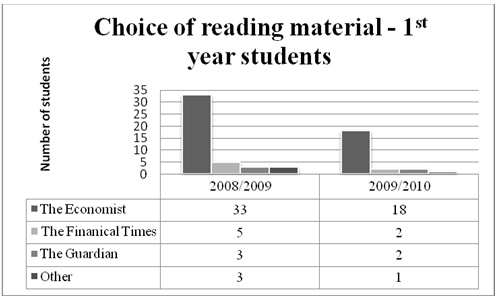
Figure 6: Choice of reading material
The same analysis could not be carried out for the 3rd year students as they were required to select more complex reading materials (i.e. professional and scientific papers or books). It can only be observed that an average of 94% of all 3rd year students (i.e. 65 students in total) complied with the requirements of choosing either a professional or scientific article or a book as their reading material. Only 6% of them (i.e. 4 students) failed to comply with this requirement and selected general magazine articles with business or economics related contents. Out of the students who selected appropriate material, 89% chose professional or scientific papers, whilst 11% chose books.
Because the students were free to choose the business and economics related vocabulary on their own, we shall not deal with a detailed analysis of these choices in this contribution. It was only established that not all the students complied with the requirement of selecting technical terminology. In the two groups of 1st year students, approximately 34% of them included at least one word in their lists that can be classified as a general vocabulary item. Among the 3rd year students, this percentage was lower (i.e. 17%).
A brief analysis of the translations of lexical items (‘entries’) and their corresponding
definitions into Slovenian concentrated mainly on the suitability of translated terminology.
In general, we were able to divide the translations of terminology into two broad
groups, i.e. the correct and incorrect. The incorrect translations could further
be divided into those which were the result of a wrong interpretation of the context
in which a word or a phrase occurred or, mostly in the case of phrases, the result
of word-
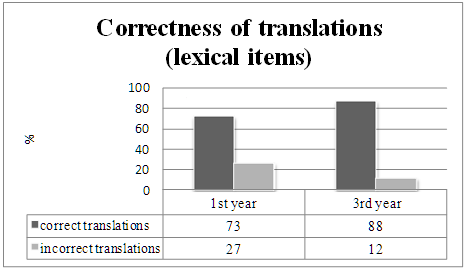
Figure 7: Correctness of translations (lexical items)
On average, 88% of the 3rd year students and 73% of the 1st year students (academic years 2008/2009 and 2009/2010 combined) managed to find the appropriate Slovenian equivalents of the lexical items in English. The 3rd year students exhibited a higher level of correctness in translating lexical items into Slovenian or finding the appropriate Slovenian equivalents.
A similar result was obtained when analysing the translated definitions. Apart from
the word-
4. Discussion
The results of the quantitative and qualitative analysis of the students’ comments and a brief linguistic analysis of the translated lexical items and their definitions led us to some significant observations.
From the results obtained by analysing the students’ comments about the contents and processes connected with this activity, it can be established that the difficulties experienced by the 1st year students in terms of material selection originate mainly in their lack of knowledge regarding business and economics related topics and business/economics terminology. Unfortunately, the task could not be carried out in the second or any other later semesters because the Business English 1 course in the Industrial Engineering programme is taught in only one semester in the first year of study. In contrast, the 3rd year students found it much easier to relate to the material for the seminar papers because they recognise the link between them and their usefulness for their study of business and economics topics and their future careers. Therefore, we can claim that the majority of 1st year students had problems in selecting the reading material while the 3rd year students did not.
Similarly, the choice of lexical items included in the seminar papers and the issues related to this process also heavily depended on the students’ familiarity with the field of study. The results show that the 1st year students had quite a few problems in this respect. Contrary to that, the 3rd year students did not report any major difficulties. The majority of 1st year students had most problems with differentiating between technical terminology and general vocabulary as well as general difficulty in understanding the materials’ contents. On the other hand, the majority of the 3rd year students based their selection of vocabulary on its applicability and usefulness. We believe that these differences are mainly the result of the students’ familiarity with economics and business topics and related terminology. It has to be noted, however, that there is a significant difference between the two groups of the 1st year students and the two groups of the 3rd year students regarding the percentages of those students who had trouble in selecting the lexical items for translation. We believe that this statistical difference is the result of the number of submitted seminar papers per year of study in both academic years.
Finding adequate definitions and translating them presented more problems for both
groups of students than anticipated. The results from all four groups of students
show that finding a suitable definition for the selected lexical items was quite
difficult. Comparing the results obtained from the seminar papers submitted by the
1st year students with the results obtained from the 3rd year students, we can establish
that the 1st year students were less critical towards the vocabulary-
Of all the stages of the activity, the students found the translation process the
most difficult. The data obtained for this part of the activity point to the fact
that most students found the translation extremely difficult. The analysis has revealed
that some students did not know how to deal with the translations of words and phrases
for which they could not find Slovenian equivalents. As regards the correctness of
the translations, the prevalent reason for inappropriate translations was the word-
In contrast to the prevailing opinion among students that the translation process was demanding, the overall impression about the usefulness of this seminar paper was unexpectedly good. Most students reported that the task was beneficial for their language acquisition, i.e. they saw it as a positive experience. We believe that the positive attitude towards the task and personal achievements reported by the majority of students contributes to an increased level of motivation for further individual study of technical terminology, which was one of the main goals of the activity.
5. Conclusions
Looking back at the rationale behind this approach and the results obtained from
this study leads us to the following conclusions. The primary goal of the activity
was to enhance the learning process of new vocabulary through extensive reading.
Based on the analysis of the students’ comments, we can see that the goal was achieved
to a large degree as most students reported that the task helped them learn new words
and phrases. Second, the activity was intended to encourage the students’ autonomous
learning in compliance with the Bologna concept. Since the completion of the task
lasted approximately 10 weeks, during which the students had to carry out a great
deal of independent work, we may claim that this objective was also achieved. The
third aim was to sensitise the students in terms of the quality of information found
in various types of resources. This aim was only partly achieved as quite a few students
included information in their seminar papers which was inappropriate in terms of
contextual use. As regards the framework of bilingual instruction of specific profession-
Nonetheless, the results have shown that in future more emphasis should be placed
on instructing the students in how to search for the correct Slovenian equivalents
of English business and economics terminology in order to avoid the pitfalls of word-
Summing up, one of the main advantages of the approach discussed in this paper is therefore the fact that the students were actively engaged in vocabulary acquisition rather than mere passive receivers of language input. The execution of the task was also facilitated by the abundance of business and economics terminology resources in the English language. Of course, the suitability of this approach should be tested in other LSP courses and other languages as well. Furthermore, an investigation into any of the specific issues raised in this contribution (the processes related to the choice of material, the selection of vocabulary, the selection of definitions and translation) would be welcome.
1 'Evroterm –Multilingual terminology database' can be accessed at: http://evroterm.anyterm.info/index.php?jezik=angl
2 All the statements in italics in this section and in all further sections are the students' comments taken from their seminar papers.
3 'Amebis Presis' is an online translation tool and can be accessed at: http://presis.amebis.si/prevajanje/?jezik=en
References
Bocanegra-
Brown, D. (1994). Teaching by principles: an interactive approach to language pedagogy. New Jersey: Prentice Hall Regents.
Fortanet, I. and Räisänen, C. (eds.). (2008). ESP in European higher education: integrating language and content. Amsterdam: J. Benjamins
Hulstijn, J.H., Hollander, M. and Greidanus, T. (1996). Incidental vocabulary learning
by advanced foreign language students: the influence of marginal glosses, dictionary
use, and reoccurrence of unknown words. The Modern Language Journal, 80, 327-
Available: http://www.jstor.org/stable/pdfplus/329439.pdf?acceptTC=true (20.9.2009)
Hunt, A. and Beglar, D. (2005). A framework for developing EFL reading vocabulary.
Reading in a Foreign Language, 17, 1-
Hutchinson, T. and Waters, A. (1994). English for specific purposes: a learning-
Knight, S. (1994). Dictionary Use While Reading: The Effects on Comprehension and
Vocabulary Acquisition for Students of Different Verbal Abilities. The Modern Language
Journal, 78, 285-
Krashen, S. (1981). Second language acquisition and second language learning. UK: Pergamon Institute of English.
_____. (1982). Principles and practice in second language acquisition. New York: Pergamon Institute of English.
_____. (1989). We acquire vocabulary and spelling by reading: additional evidence
for the input hypothesis. The Modern Language Journal, 73, 440-
Laufer, B. and Hadar, L. (1997). Assessing the effectiveness of monolingual, bilingual,
and “bilingualized” dictionaries in the comprehension and production of new words.
The Modern Language Journal, 81, 189-
Lessard-
Mohseni-
Petrylaitė,R., Vėžytė, T. and Vaškelienė, D. (2008). Changing Skills of Dictionary
Use. Studies about Languages (Kalbų Studijos), 12 / 2008, 77-
Tumolo, C.H.S. (2007). Vocabulary and reading: teaching procedures in the ESP
classroom. Linguagem & Ensino, 10 (2), 477-
7. Appendices
Appendix 1
The structure of the seminar paper with instructions
1. Introduction
Write your reasons for selecting a particular text and briefly describe its contents. The introduction is limited to approximately 120 words. All comments must be written in English.
2. Selection of terminology
Choose at least 15 lexical items from the selected text (business/economics words or phrases). For each lexical item, provide the English definition as well as the Slovenian translation/equivalent of the lexical item and the translation of the English definition. You should translate the definitions on your own. Do not use any online translation tools. Length of definitions:
a) 1st year students: you are allowed to write short definitions,
b) 3rd year students: you must select more comprehensive definitions.
All definitions, lexical items and their translations, as well as contextual information, have to be properly cited. Standard organisation of each ‘lexical entry’ is shown below.
_________________________________________________________
LEXICAL ITEM IN ENGLISH (word / phrase)
Definition of lexical item in English
Source: e.g. http://www.........
LEXICAL ITEM IN SLOVENIAN (word / phrase)
Translation of the lexical item’s English definition in Slovenian
The context in which the lexical item was found (the sentence or the clause if the sentence is too long).
Source: e.g. http://www......... _________________________________________________________
3. Comment
After completing the seminar paper, comment on any difficulties and positive experience you had related to the completion of this paper. Write about:
a) Selection of the text
b) Selection of lexical items
c) Choice of definitions
d) Translations (translation of vocabulary and translation process as such)
e) Personal achievement
The comment must be written in English in approximately 120 words.
4. Bibliography
Cite the source of the text, the sources of all the definitions and all the glossaries and dictionaries you consulted. Use the Chicago Manual of Style.
Appendix 2
A selection of online dictionaries and glossaries
http://www.nytimes.com/library/financial/glossary/bfglosa.htm
http:///www.imf.org/external/np/exr/glossary/index.asp
http://www.investopedia.com/dictionary/default.asp
http://www.finance-
http://www.trading-
http://www.forbes.com/tools/glossary/index.jhtml
http://www.washingtonpost.com/wp-
http://www.oxfordadvancedlearnersdictionary.com
http://www.thefreedictionary.com/
(CC) SDUTSJ 2011. Zbirka Inter Alia je objavljena pod licenco Creative Commons
Priznanje avtorstva-